Related Research Articles

Judaism is an Abrahamic, monotheistic, and ethnic religion, comprises the collective spiritual, cultural, and legal traditions of the Jewish people. Contemporary Judaism having originated as an organized religion in the Middle East during the Bronze Age, and evolved from Yahwism, the cultic polytheistic religious movement of ancient Israel and Judah, around the 6th/5th century BCE, and is thus considered to be one of the oldest monotheistic religions. Along with Samaritanism, to which it is closely related, Judaism is one of the two oldest Abrahamic religions.

Louis Ginzberg was a Russian-born American rabbi and Talmudic scholar of Lithuanian-Jewish descent, contributing editor to numerous articles of The Jewish Encyclopedia (1906), and leading figure in the Conservative movement of Judaism during the early 20th century.
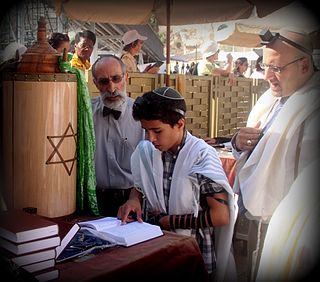
A bar mitzvah (masc.) or bat mitzvah (fem.) is a coming-of-age ritual in Judaism. According to Jewish law, before children reach a certain age, the parents are responsible for their child's actions. Once Jewish children reach that age, they are said to "become" b'nai mitzvah, at which point they begin to be held accountable for their own actions. Traditionally, the father of a bar or bat mitzvah offers thanks to God that he is no longer punished for his child's sins.

The Chosen is a novel written by Chaim Potok. It was first published in 1967. It follows the narrator, Reuven Malter, and his friend Daniel Saunders, as they grow up in the Williamsburg neighborhood in Brooklyn, New York, in the 1940s. A sequel featuring Reuven's young adult years, The Promise, was published in 1969.
Adherents of Judaism do not believe that Jesus of Nazareth was the Messiah nor do they believe he was the Son of God. In the Jewish perspective, it is believed that the way Christians see Jesus goes against monotheism, a belief in the absolute unity and singularity of God, which is central to Judaism; Judaism sees the worship of a person as a form of idolatry, which is forbidden. Therefore, considering Jesus divine, as “God the Son”, is forbidden. Judaism's rejection of Jesus as the Messiah is based on Jewish eschatology, which holds that the coming of the true Messiah will be associated with events that have not yet occurred, such as the rebuilding of The Temple, a Messianic Age of peace, and the ingathering of Jews to their homeland.
Karaite Judaism or Karaism is a Jewish religious movement characterized by the recognition of the written Tanakh alone as its supreme authority in halakha and theology. Karaites believe that all of the divine commandments which were handed down to Moses by God were recorded in the written Torah without any additional Oral Law or explanation. Unlike mainstream Rabbinic Judaism, which regards the Oral Torah, codified in the Talmud and subsequent works, as authoritative interpretations of the Torah, Karaite Jews do not treat the written collections of the oral tradition in the Midrash or the Talmud as binding.

Abraham "Abe" Cahan was a Lithuanian-born Jewish American socialist newspaper editor, novelist, and politician. Cahan was one of the founders of The Forward, an American Yiddish publication, and was its editor-in-chief for 43 years. During his stewardship of the Forward, it became a prominent voice in the Jewish community and in the Socialist Party of America, voicing a relatively moderate stance within the realm of American socialist politics.

Chaim (Halevi) Soloveitchik, also known as Chaim Brisker, was a rabbi and Talmudic scholar credited as the founder of the Brisker approach to Talmudic study within Judaism. He was also a member of the Soloveitchik dynasty, the son of Yosef Dov Soloveitchik.

Simeon Singer (1846–1906) was an English Rabbi, preacher, lecturer and public worker. He is best known for his English translation of the Authorised Daily Prayer Book, informally known as the "Singer's Siddur".

Nathan of Breslov, also known as Reb Noson, born Nathan Sternhartz, was the chief disciple and scribe of Rebbe Nachman of Breslov, founder of the Breslov Hasidic dynasty. Reb Noson is credited with preserving, promoting and expanding the Breslov movement after the Rebbe's death. Rebbe Nachman himself said, "Were it not for Reb Noson, not a page of my writings would have remained."
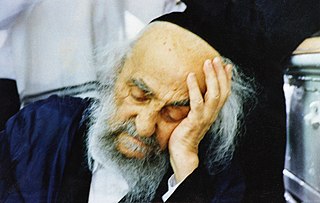
Levi Yitzchok Bender (1897–1989) was a rabbi and leader of the Breslov community in both Uman, Ukraine and Jerusalem.

The Yeshiva is an English translation by Curt Leviant of the Yiddish novel Tsemakh Atlas by Chaim Grade. It was published in two volumes in Yiddish and also in translation. It was also published in a Hebrew translation, with the same title as the Yiddish.
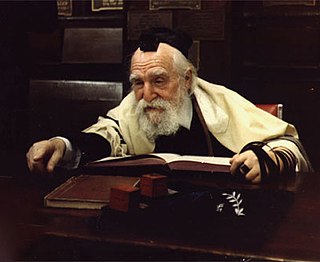
Moshe Feinstein was a Russian-born American Orthodox Jewish rabbi, scholar, and posek. He has been called the most famous Orthodox Jewish legal authority of the twentieth century and his rulings are often referenced in contemporary rabbinic literature. Feinstein served as president of the Union of Orthodox Rabbis, Chairman of the Council of the Moetzes Gedolei HaTorah of the Agudath Israel of America, and head of Mesivtha Tifereth Jerusalem in New York.
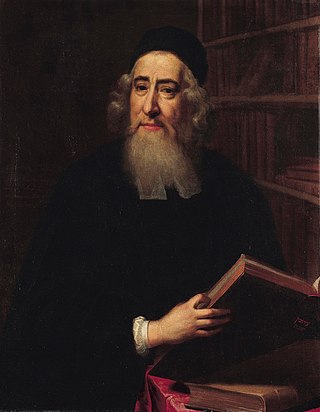
Rabbi Aaron Uri Phoebus Hart was a British rabbi, who served as spiritual leader of the Ashkenazi Great Synagogue of London from 1704 until his death. He is widely regarded as the first chief rabbi of Great Britain.
Gateshead Talmudical College, popularly known as Gateshead Yeshiva, is located in the Bensham area of Gateshead in North East England. It is the largest yeshiva in Europe and considered to be one of the most prestigious advanced yeshivas in the Orthodox world. The student body currently numbers approx. 350. Although students are mainly British, there are European, American, Canadians as well as some from South America, Australia and South Africa.

Louis E. Miller (1866–1927), born Efim Samuilovich Bandes, was a Russian-Jewish political activist who emigrated to the United States of America in 1884. A trade union organizer and newspaper editor, Miller is best remembered as a founding editor of Di Arbeiter Tsaytung, the first Yiddish-language weekly published in America, and a co-founder with Abraham Cahan of the Jewish Daily Forward, the country's first and foremost Yiddish-language daily.
Illui is a young Talmudic prodigy. The Hebrew term is applied to exceptional Talmudic scholars among Jews.

Jules Chametzky was an American literary critic, writer, editor, and unionist. His essays in the 1960s and 1970s on the importance of race, ethnicity, class, and gender to American literary culture anticipated the later schools of New Historicism and Cultural Studies in American letters. Chametzky was a founder and long-time editor of the Massachusetts Review, an editor of Thought and Action, the journal of the National Education Association, as well as the third President of the Massachusetts Society of Professors, the faculty/library union at the University of Massachusetts. He was also a founding member of the Coordinating Committee of Literary Magazines and its first secretary. Chametzky was married for over fifty years to the writer, editor, and educator Anne Halley (1928–2004).
In rabbinic Jewish eschatology, the Righteous Priest or Priest of Righteousness is a figure identified with one of the Four Craftsmen in a vision mentioned in the Book of Zechariah. He is found in the Talmud and Midrash.
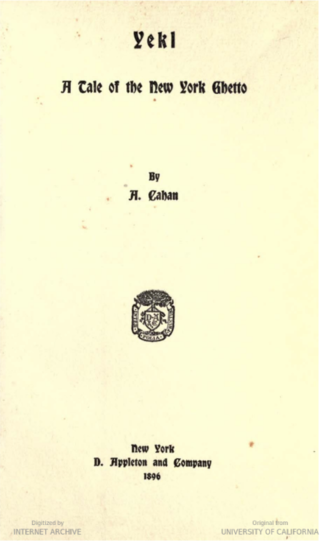
Yekl: A Tale of the New York Ghetto is Abraham Cahan's first book, published in 1896. It depicts the life of Jewish immigrants living in a New York City ghetto. The plot follows Yekl, Russian-Jewish immigrant sweatshop worker, as he attempts to assimilate into American culture. His attempts are complicated by the arrival of his wife and son, which force him to decide between his Jewish identity and a new American one.
References
- ↑ Richard F. Shepard (March 27, 1983). "STAGE: JEWISH THEATER'S 'RISE OF DAVID LEVINSKY'". The New York Times .
It would seem impossible ... American Jewish Theater has done so glowingly at the 92d Street Y.
- ↑ Kenneth Jones (March 19, 2007). "Avi Hoffman to Reprise Role in FL Premiere of David Levinsky".
- ↑ Mary Damiano (March 23, 2007). "Avi Hoffman's rising again in David Levinsky reprise". Sun-Sentinel .
- ↑ Gloria Cole (January 12, 1987). "'The Rise of David Levinsky' is a triumph for off-Broadway". UPI (United Press International).
- 1 2 Hilary Daninhirsch (February 4, 2011). "The Rise of David Levinsky". The Jewish Chronicle .
- ↑ Susan Kittner Huntting. "The Rise of David Levinsky, by Abraham Cahan".
.. is considered to be the first American novel to chronicle the Jewish American immigrant experience at the end of the 19th century.
- ↑ Susan Kittner Huntting. "The Rise of David Levinsky, by Abraham Cahan".
- 1 2 "The Rise of David Levinsky". encyclopedia.com.
- ↑ "Howells ... befriended Cahan in 1895"
- ↑ "The Rise of David Levinsky".
- ↑ Susan Kittner Huntting. "The Rise of David Levinsky, by Abraham Cahan".
What became the book The Rise of David Levinsky originally appeared as four related short stories in ...McClure's
- ↑ 2011 interview: Ellilot Resnick (February 11, 2011). "Veteran Newspaperman Seth Lipsky Reminisces On His Career". The Jewish Press . p. 10.
- ↑ Mackes, Marilyn F., "The rise of David Levinsky: Autobiographical mask for a dispossessed American Adam." (1983). Theses and Dissertations. Paper 2460.
- ↑ "The Rise of David Levinsky and Portnoy's Complaint".
- ↑ with an introduction by Jules Chametzky: Cahan, Abraham (March 1993). Penguin edition: The Rise of David Levinsky. ISBN 978-1440-6742-35.